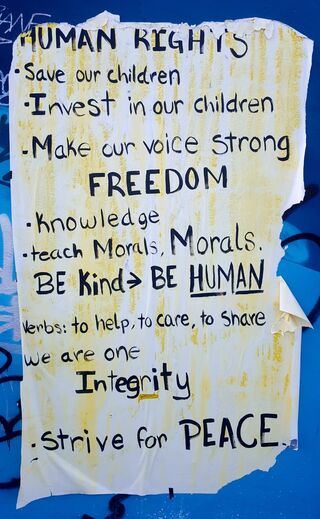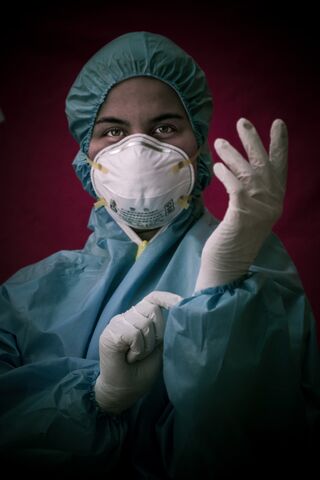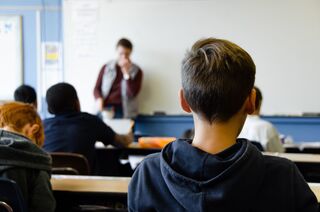Moral Injury
Are Teachers or School Buildings Essential?
We asked the wrong question and it’s causing moral injury.
Posted August 9, 2020 Reviewed by Ekua Hagan

Psychiatrist Jonathan Shay coined the term moral injury and has said that it occurs when we experience a deeply felt sense of transgression, or when we witness a betrayal of “what’s right” by someone who holds legitimate authority (e.g., a school board) in a high-stakes situation like the one we are currently in with the decision to re-open schools during a pandemic. Moral injury can also occur when any of us fails to stop what we witness as cruel and goes against what we hold as deeply rooted moral beliefs and expectations.
Now, imagine you are a working parent trying to get through the day without feeling crippling guilt and shame from the intrusive thoughts you keep having: Why didn’t you say more to advocate for remote learning so that Mrs. Johnson, your child’s beloved teacher and one of your best friends, wouldn’t have had to die? She died of COVID-19, and she left behind a beautiful child with multiple medical complications and an abusive father, because her daughter also caught COVID-19, but lived. She may have chronic lung problems forever, without her mom to help her through the toughest challenges. You know that Mrs. Johnson’s daughter is likely being emotionally abused by her dad, who is now her only caregiver, because Mrs. Johnson confided in you that she was in the process of divorcing him at the time of her death because she could no longer take the abuse. Mrs. Johnson was the third staff member to die in the school, after a cafeteria worker and a janitor.
Why didn’t you speak up at the school board meetings to tell them you didn’t mind doing remote learning, as hard and stressful as it would have been, because it was worth it to you to save lives? Your daughter now suffers nightmares and crippling anxiety and guilt that she does not yet understand that she need not own as her moral responsibility for what occurred in your community.
The answers to your daughter’s constant questions seem so obvious now: “Mom, why didn’t we just do remote learning this year so Mrs. Johnson didn’t have to die and leave her daughter? I don’t mind learning this way. Why did they have to make us go into that building? Mrs. Johnson didn’t have to die because we had a way to keep her safe, we just didn’t do it. Why did they send all of us back to school knowing that some of us might get sick? I don’t trust anyone in our school. They don’t care about us. We are just a number to them.”
The outbreak spread quickly and the virus respected none of the community’s interests for in-person school. It exploited the community’s public health weak link: the strong wish for in-person school. You are in a district that went with in-person school this year during an out-of-control pandemic. You opened your email a few weeks ago and there it was: “We regret to inform you that one of our teachers has died of COVID-19…”
You immediately started assessing your parenting skills and now believe yourself to be an utter failure. You are wracked with guilt, replaying different scenarios that would have resulted in different outcomes, and every day you have thoughts of self-condemnation of your inaction when it mattered—when decisions were being made. You question the example you have set for your daughter because you stayed silent on an issue that mattered a great deal to you.
You ask yourself what role you played in this community’s pain and loss, and your friend’s death. You saw a moral violation occurring and you did nothing. You were too focused on the loss and sorrow that you and your family had experienced during the quarantine months. You thought you all needed in-person school and, at the time, you could only see that it would feel so good to have at least a bit of normal, and for your daughter to have the benefits of in-person education and at least some socialization.
Sometimes, you feel the disturbing intrusive thoughts and relentless regret is exactly what you deserve for not speaking up when you had your chance. You are unable to concentrate at work. How could you not protect Jolene, your friend? Why didn’t anyone else care enough to face the very real possibility that this would happen?
You are experiencing headaches, have trouble sleeping, and feel betrayed by your community. You no longer talk to others in the community because you trust no one in your community to care anymore. They all seemed to want in-person school and even seem okay with the loss of their beloved community member as an outcome. They said a few things that sounded like sorrow but then moved on.
You are not able to understand why, when there was a perfectly reasonable alternative, while not easy, everyone didn’t choose what was clearly, in retrospect, the difference between what happened and preventing what happened. You knew better, and you went along with it anyway.
Your therapist tells you have developed moral injury from the moral distress you feel every day. She tells you that people who have moral injury perceive themselves to have violated, through action or inaction, their own moral codes. She tells you that individuals who are exposed to events that involve a high stakes moral decision and choose to act in ways that violate their own moral values, will often experience severe distress and functional impairments known as “moral injuries,” with hallmark symptoms such as feelings of betrayal, guilt, shame, loss of trust, self-condemnation, feeling deserving of punishment, loss of meaning and loss of religious faith.
What Is Essential?
It has frequently been stated that teachers are essential workers during this pandemic, on par with nurses and grocery store and shipping employees. But before we demand they show up to do this essential work of teaching in a school building, let’s unpack what we really mean by the word essential. Essential is a word that comes from the root essence — to be — and evolved into “to be necessary” or to be something that is “unavoidable.” To meet the definition of an essential worker during a pandemic is for a job to hold indispensable elements for the lives and functioning of society. It means that society depends on the worker to such an extent that it would be unequivocally perceived as an unavoidable job during a pandemic.

This is obviously true for nurses and food supply chain workers because they are both central to our survival. Just using the definition of the word essential, teachers obviously do not qualify as essential or indispensable because an education is not central to our survival during a pandemic. But even if we can all be convinced that they are essential, like many believe, we can still also do what we have done with personal protective equipment and telehealth in health care, and no-contact deliveries with groceries and packages—deliver essential services through an alternative method that is safer during a pandemic. Schools are not hospitals. There is no comparison between the conditions and risk factors associated with a hospital and an open school. Remote learning allows us to keep teachers and education as an essential function of society, while emphasizing that we care about the lives and health of all of our school communities during a pandemic. I don't know of a community without a school, so that's all of us.
Schools that have already lost teachers are currently suffering all of the effects of participation in a morally injurious event like this one in Arizona, where the superintendent has already lost one teacher to COVID-19, and is being forced to make a hurtful decision to the community, and as a result is in what appears to be a state of moral distress. In every school where there is death from COVID-19, school communities will be asking some version of the question to the morally injured superintendent dealing with the death of a teacher who did everything right with safety protocols and teaching without students in the classroom: “What if this virus hits me like it did Mrs. Byrd?”
The Role of Moral Distress and Moral Injury in Opening Schools

How do we know whether or not something is moral? Who defines morality? From the perspective of moral psychology, the answers can be understood through the lens of our cognitions, moral emotions (i.e., disgust, shame, and guilt felt when thinking about or witnessing the act that we perceive as a moral transgression), and the degree of moral distress or fatigue that we have in relation to the morally injurious event. Moral injury researchers describe the following moral injury risk factors that may lead to moral injury:
Moral Injury Risk Factors
- Increased risk of moral injury if the PMIE (Potentially Morally Injurious Event) happens at the same time as exposure to other stressful events (e.g., death of a loved one)
- Increased risk of moral injury if a vulnerable person (e.g., child, woman, elderly) suffers life loss
- Increased risk of moral injury when there is a lack of social support
- Increased risk of moral injury if staff feel unconscious or unprepared for emotional/psychological consequences
- Increased risk of moral injury when members are considered not to take responsibility for the event(s) and are unsupportive of personnel
If you’d like to assess whether you have had an event that has caused moral injury in the context of COVID-19, you may want to consider the following assessment, adapted for school community members from the Moral Injury Event Scale (MIES), a psychological scale typically used to assess military personnel and veterans to understand whether a morally injurious event has occurred:
- I saw things that were morally wrong.
- I am troubled by having witnessed others’ immoral acts.
- I acted in ways that violated my own moral code or values.
- I am troubled by having acted in ways that violated my own morals or values.
- I violated my own morals by failing to do something that I felt I should have done.
- I am troubled because I violated my morals by failing to do something I felt I should have done.
- I felt betrayed by leaders who I once trusted.
- I feel betrayed by fellow [community] members who I once trusted.
- I feel betrayed by others outside [my community] who I once trusted.
The Decision to Open Schools During a Pandemic
A decision to force teachers, students, and staff to co-mingle in a school building, without the capability to contain a serious virus such as COVID-19, which has no respect for the person or persons that it infects, is a decision that begs for a moral evaluation.
Like many decisions that can cause harm to people, like dropping an A-bomb on Hiroshima or going to war, there are arguments for and against them. During a pandemic, our decisions have moral consequences. Do we value the lives and long-term health of one another or do we value children’s socialization in the learning process and convenience of our lives, along with the simpler way to deliver supports in a school building as opposed to remotely? If we believe co-mingling in any group without appropriate mitigation protocols in place (a given and unavoidable consequence of opening a school building) will enable the virus to infect others unabated, then shouldn’t our decisions be made with that belief?
COVID-19 kills, so we might need to guard against our apparent mental glitch that has us thinking it won’t spread and kill us when we participate in our preferred activities or school communities. We’ve obviously gotten ourselves into a moral conundrum in this country with our dependence on schools for, well, everything from child care to social and emotional health of our students to solving the problem of food insecurity for millions of American families. And let’s not forget that kids also receive an education at school. But if school participation currently puts us all at risk of developing multiple superspreading events and superspreaders are everywhere, and COVID-19 might kill us, then change course we must. We would be wise to accept that change in our behavior is the only cure that can save us now. This requires what is commonly known in therapy as radical acceptance.
Radical Acceptance
1. Accept that interests change with new problems and circumstances.
Radical acceptance demands that we face our current reality—the virus is getting worse in America, and we are losing countless lives unnecessarily because we won’t do what it takes to get the results we want—to end this pandemic. We are not taking personal responsibility and adapting to our new landscape. If we are to accept our personal responsibilities for ending this pandemic we must ask ourselves:
- What am I personally responsible for and what belongs to others?
- What do I have to do to get the outcome that I want?
2. Embrace change and see it as inevitable.
If we keep on going in the direction we’re going, I wonder where we will be when we get there. We have patchwork responses to the pandemic and we are ignoring the legitimate rights of teachers, health care workers, and all essential workers when we try to behave in our pre-pandemic behaviors of gathering together for any reason. We are acting in ways that go against our own moral code when we gather, knowing it could kill others or ourselves. Therefore, we all have a valid reason for asking one another to stay away from each other so that we can all have a chance to continue living and spare ourselves and loved ones from long term health consequences of this virus.
Our souls are deeply connected, and some of us are going to leave this world because we caught COVID-19 from one another. It would bring us all more peace if we would recognize that we have a soul obligation to the ones we leave behind. We will all suffer more if we don’t register the current sorrows of the planet in our minds and act accordingly. We will literally be leaving a legacy of lifetime sorrow and grief behind if we do not do a better job of making moment-to-moment decisions that protect one another from the coronavirus. For those left behind, don’t we owe it to them to provide the comfort and peace that we did everything we could to keep us all safe?
If we’re not making all of our lives and health a priority, it simply means we are unwilling to protect one another’s lives. However, there is compelling evidence that going with the reasonable alternative for this year by doing remote learning with compassion can have a major effect on how we all experience remote learning this fall, and reduce the risk of moral injury in all of our communities. Remote learning would make it a lot easier to live with ourselves because in doing so, we would be telling Mrs. Byrd in Arizona that we learned the hard way—she is essential! She was an indispensable element of getting through this pandemic, and now we’ve lost her and have to try to go on without her. Was her death preventable? Probably.
We should go with remote learning to do what we can to protect one another. If we recognize that all of us are vulnerable to catching COVID-19 and perhaps occasionally considering writing our own obituaries, then what it really comes down to is, if we are leaving this world, we owe it as an act of respect and human decency to try to do whatever we can to mitigate against further damage from this virus. If we leave, there will be others that remain. We would all sleep much better, and it would be a lot easier to live with ourselves and one another, if we do whatever we can as an act of deep care and concern for those we leave behind. If we truly feel this, then it puts us in a profound state of connectedness to one another in every decision we make.




